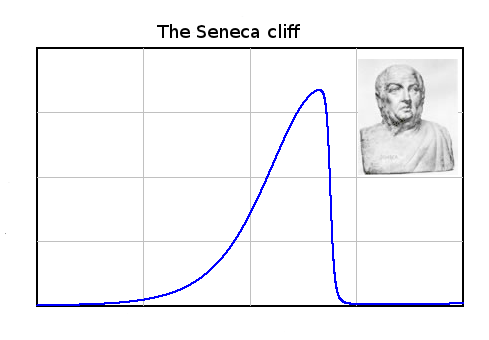Very often, we fail to understand the delayed effects of our actions. John Sterman reminds us of this point in a talk on global warming quoting Robert Louis Stevenson as saying, "Everybody, sooner or later, sits down to a banquet of consequences." The models shown here tell us that the Seneca cliff is the result of delayed consequences.As always, the future is something that we build with our actions and the models can only tell us what kind of actions will lead us, eventually, to a certain outcome. Used in this way, models can be extremely useful and can even be applied to systems which are much more modest than an entire civilization, for instance to a single company or to our personal relationships with other people. In all cases, the Seneca effect will be the result of trying hard to keep things running as usual. In that way, we may run out faster of the resource that keeps the system running: be it a physical resource or a reserve of goodwill. The way to avoid this outcome may be to let the system run the way it wants, without attempting to force it to go the way we want it to go. In other words we need to take things in life with some stoicism, as Seneca himself would probably have said.Thinking of the worldwide situation and of the problems involved, global warming and resource depletion, what the models tell us is that the Seneca cliff may be the inevitable result of putting too much strain on already badly depleted natural resources. We should try, instead, to develop alternative stocks of resources such as renewable (or nuclear) energy. At the same time, we should avoid to exploit highly polluting and expensive resources such as tar sands, oil shales, deepwater oil, and, in general, applying the "drill, baby, drill" philosophy. All those strategies are recipes for doom. Unfortunately, these are also examples of exactly what we are doing.I don't know what Seneca would say if he could see this planet-wide effort we are making in order to put into practice the idea that he expressed in his letter to his friend, Lucilius. I can only imagine that he would take it with some stoicism. Or, maybe, he would comment with what he said in his "De Providentia" "Let Nature deal with matter, which is her own, as she pleases; let us be cheerful and brave in the face of everything, reflecting that it is nothing of our own that perishes."
agora, sobre as atribulações de um independente de esquerda nestes tempos da III República ...
31 de agosto de 2011
O efeito Seneca, ou os efeitos adiados, ou o banquete das consequências - de aplicação generalizada a diversos domínios
Subscrever:
Enviar feedback (Atom)

Sem comentários:
Enviar um comentário